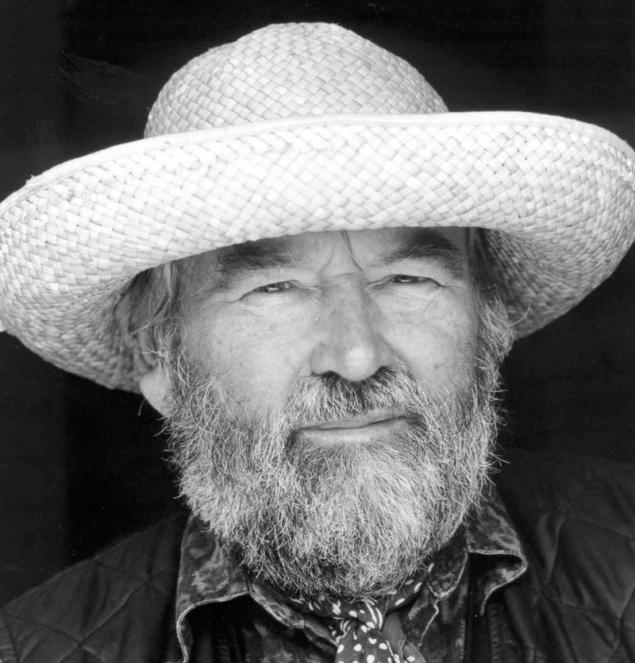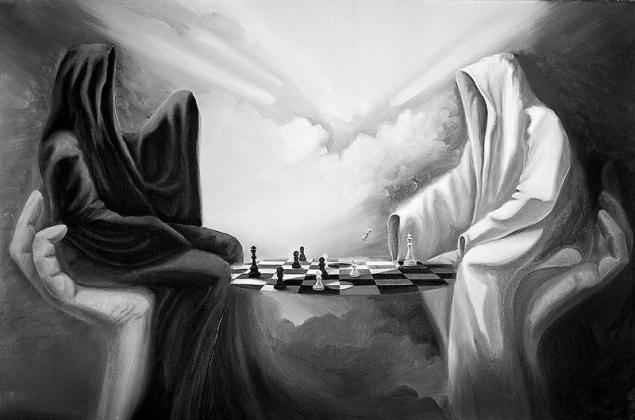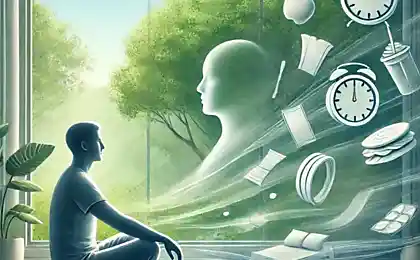657
John Fowles: Freedom of will in a world without freedom is like a fish in a world without water
Good why so little?
Immediately after the publication of his famous novel "the Collector" John Fowles (1926 — 2005) published in 1964 a collection of essays "Aristos", which he wanted to explain the meaning of the novel and to reveal their ethical attitudes. One of the main problems of his time, Fowles saw the inequality in society, objectively existing confrontation between the Few and the Many, the intellectual minority and all the rest. The decision Fowles saw that Few were aware of their responsibility and began to do good in the name of justice.
In this fragment from the book "the Aristos" the writer talks about why, despite the fact that they admit that to do good is, in reality, good deeds done for much less than they could, and that you need to understand that good deeds become greater.

46. And yet, even given all these reasons — given that not-doing good deeds often occurs, apparently, from our inability to understand some of the possible ways is really the best, or a sincere inability to recognize any need to act (an ancient heresy of quietism), we all know that doing less good than they could. As if we were stupid, there are particular situations, when all obvious which way you need to go to do good, and yet we evade the way; as we have no selfish, there are times when the path of goodness does not require from us any sacrifice, yet we shy away from it.
47. For the past two and a half millennia almost every great thinker, the Saint, the artist advocated, personified and glorified — if not directly, then indirectly — the nobility and unquestionable value of good deeds as a fundamental principle of just society. Both social and biological value of good deeds, according to their testimony, no doubt. One is forced to ask myself I do not err that great, and no closer mere mortals, most of whom, to understanding some let a vicious, but a much deeper truth: generally speaking, it is better to do nothing than, again generally speaking, to do good.
48. In my opinion, in this strange, irrational apathy to blame religion born of the myth that by doing right, we enjoy — if there is an afterlife, then there is eternal bliss and that the doers of good happier evildoers. The world is rich in evidence that all this is really nothing more than myths: the righteous are often unhappy where villains and good deeds often bring suffering.
Just as man is forever seeking that all of the moves, he's always waiting for a reward. It all seems that there must be some kind of compensation for good deeds is something more substantial than just a clean conscience and a sense of self-righteousness.
Hence the irrefutable conclusion: good works should bring (and, therefore, knowingly to promise) a pleasure. And if not, then the game is just not worth it.
49. There are two obvious "type" of fun. The first can be called intentional, or planned, in the sense that an event that delivers fun, date with a sweetheart, a concert is planned in advance and carried out in accordance with your intentions. The second and much more important kind — the pleasure is accidental, or unintentional, in the sense that it occurs unexpectedly: it is not only unexpected meeting with an old friend, suddenly revealed to you the beauty of some in normal times very ordinary landscape, but all those elements of your intentions to have fun, which it was impossible to predict. <...>
50. What immediately catches the eye when it comes to these two types of pleasure is that they are both in great extent depend on the case. Say the girl is about to get married, all long since planned. Nevertheless, when the day of the wedding and the rite of marriage, her not feeling that she was lucky. After all, nothing ever happened — and how much could be obstacles! — what would prevent it to happen. And now she, perhaps, looking back, remembers that first, chance meeting with a man who just became her husband: a fundamental element of chance clearly comes to the fore. In short, we put in conditions, when the pleasure of both types is perceived as primarily the result of the case. We not only come to pleasure, how much pleasure comes to us.
51. But once we begin to treat pleasure as a kind of winning bets and then go a little further, hoping that in this way we can get pleasure from moral choice and the related actions, is pretty close to a disaster. The atmosphere of unpredictability, penetrating through one world, like the plague, inevitably penetrates into the other.

Case governs the laws of pleasure — so let it, we say, governs the laws of a good cause. Worse, from here we come to the conclusion that only those good deeds, which promise fun and should make. A source of enjoyment may be public recognition, someone's personal appreciation, self-interest (calculating, for the good that you will pay back good); the hope for bliss in the afterlife; deliverance from the guilt, if any, embedded in the consciousness of the cultural environment.
But in any of these cases, neither explains its historical necessity nor justify from the point of view of pragmatics, this kind of motive creates a very unhealthy climate around our intentions to do as it should.
52. To do good in the calculation of any public reward is not to do good: it means doing something based on public rewards. The fact that this is done at the same time good, can, at first glance, to justify such motives to action; but in this justification lies the danger, and I intend to prove it.
53. There is a third, not so obvious type of pleasure, which we usually do not link the idea of fun, although we feel it. Let's call it functional, since it's the pleasure we get from life in all its manifestations — from what we eat, defecate, breathe, in General, exist. In a sense, they are the only pleasures in which we can not afford to refuse. If we don't clearly distinguish this type of pleasure, then this is because they are fun of two other, much more lucid and more complex types. When I eat what I want, I have planned fun; when I enjoy what I eat, beyond expectations, I enjoy the unexpected, but underneath it all lies the functional pleasure of eating, as there is a means to support existence. Using the terminology of Yung, the third type should be regarded as archetypal, and because of it, in my opinion, we should deduce the motives for committing good deeds.In medical language, good we need to evacuate — do not ejaculate.
54. We never tire of the administration of natural physiological functions of the body. Don't expect external rewards for what we send them — it is clear that remuneration in the administration.He-administration leads to disease or death, in the same way as non-sending of good deeds eventually lead to death of society. Charity, good deeds towards others, acts against the injustices and inequalities that must be done for hygienic, not for fun.
55. What then develops is achieved thus the functional "health"? The most important element of the following: good cause (and the concept of "good deed" here I rule out any action, the true motive which serves as public recognition) is the most convincing of all possible evidence that we do have relative free will. Even when a good deed is not at odds with personal interests, it requires the absence of personal interest or, if you look at it in this way is optional (from the point of view of biological requirements) power consumption. This act, against inertia, against the fact that otherwise the whole would be subject to inertia and natural process. In a sense it is an act of the divine in the ancient understanding of the "divine" as the intervention of free will in the material realm, imprisoned in their materiality.
56.All our concepts of God are concepts of our own potential. Mercy and compassion as universal attributes of the most sophisticated (under whatever guises they external or hidden) concepts of God are nothing but those qualities which we approve is a dream in itself.They have no relationship to any external "absolute" reality: they are a reflection of our hopes.
57. In everyday life we find it difficult to separate the selfish motives of "hygienic" motive, which I isolated in a separate category. However, the hygienic motive can always be used to assess other motives. It is a matter how they measure, especially with regard to the, alas, extensive variety, when of good, in the eyes of the doer, the act turns into a result of undeniable evil.
Among the inquisitors, among the Protestant witch hunters, and even among the Nazis, to exterminate whole Nations, were undoubtedly those who quite sincerely and unselfishly believed that do good. But even if they suddenly were right, anyway to find out what motivated their desire to receive the dubious reward for all their "good" cause. They hoped that the coming better world — for themselves and their co-religionists, but not for the heretics, witches and Jews, whom they exterminated. They did so not for the sake of freedom, but for the sake of greater pleasure.
58. Free will in a world without freedom is like a fish in a world without water. It cannot exist, because it finds no application. Political tyranny ever goes astray, if the tyrant free, while his subjects are in bondage; but he himself was a victim of his own tyranny. He is not free to do as he wants, because what he wants is predetermined, and usually in a very narrow limits, the necessity to preserve the tyranny. And this political truth is also true on a personal level. If the intent to commit a good deed does not lead to establish more freedom (and therefore, more justice and equality) for all, it will be partly malicious, not only for the object of the action, but also for someone who commits this action as constituting evil, hidden intent, will inevitably lead to the limitation of his own freedom. If we translate it into the language of functional pleasure, the closest would be the comparison with food that is not timely withdrawn from the human body: its nutritional value is influenced by the resulting harmful elements negated.
59. Over the last two centuries of personal and public hygiene and cleanliness have risen to a higher level; it happened mainly because people strongly inspired: if sickness overtakes them when they are dirty and lethargic, it is not because so ordered by God, but because so dispose nature, and it is quite possible to prevent it; not because that is how our miserable world, but because so are the verifiable mechanisms of life.
60. We were the first, physical, or bodily, hygienic phase of the revolution; it is time to go to the barricades and fight for the next psychic phase. Not to do good, when you could do it with the obvious benefit of all, not to act immoral: it simply means to walk around as if nothing had happened, when you have your hands stained smeared with excrement. published
@ John Fowles "the Aristos", translation Natalia Rogovskaya.
P. S. And remember, just changing your mind - together we change the world! ©
Source: izbrannoe.com/news/mysli/dzhon-faulz-o-dobrom-dele-kak-akte-gigieny/
Immediately after the publication of his famous novel "the Collector" John Fowles (1926 — 2005) published in 1964 a collection of essays "Aristos", which he wanted to explain the meaning of the novel and to reveal their ethical attitudes. One of the main problems of his time, Fowles saw the inequality in society, objectively existing confrontation between the Few and the Many, the intellectual minority and all the rest. The decision Fowles saw that Few were aware of their responsibility and began to do good in the name of justice.
In this fragment from the book "the Aristos" the writer talks about why, despite the fact that they admit that to do good is, in reality, good deeds done for much less than they could, and that you need to understand that good deeds become greater.

46. And yet, even given all these reasons — given that not-doing good deeds often occurs, apparently, from our inability to understand some of the possible ways is really the best, or a sincere inability to recognize any need to act (an ancient heresy of quietism), we all know that doing less good than they could. As if we were stupid, there are particular situations, when all obvious which way you need to go to do good, and yet we evade the way; as we have no selfish, there are times when the path of goodness does not require from us any sacrifice, yet we shy away from it.
47. For the past two and a half millennia almost every great thinker, the Saint, the artist advocated, personified and glorified — if not directly, then indirectly — the nobility and unquestionable value of good deeds as a fundamental principle of just society. Both social and biological value of good deeds, according to their testimony, no doubt. One is forced to ask myself I do not err that great, and no closer mere mortals, most of whom, to understanding some let a vicious, but a much deeper truth: generally speaking, it is better to do nothing than, again generally speaking, to do good.
48. In my opinion, in this strange, irrational apathy to blame religion born of the myth that by doing right, we enjoy — if there is an afterlife, then there is eternal bliss and that the doers of good happier evildoers. The world is rich in evidence that all this is really nothing more than myths: the righteous are often unhappy where villains and good deeds often bring suffering.
Just as man is forever seeking that all of the moves, he's always waiting for a reward. It all seems that there must be some kind of compensation for good deeds is something more substantial than just a clean conscience and a sense of self-righteousness.
Hence the irrefutable conclusion: good works should bring (and, therefore, knowingly to promise) a pleasure. And if not, then the game is just not worth it.
49. There are two obvious "type" of fun. The first can be called intentional, or planned, in the sense that an event that delivers fun, date with a sweetheart, a concert is planned in advance and carried out in accordance with your intentions. The second and much more important kind — the pleasure is accidental, or unintentional, in the sense that it occurs unexpectedly: it is not only unexpected meeting with an old friend, suddenly revealed to you the beauty of some in normal times very ordinary landscape, but all those elements of your intentions to have fun, which it was impossible to predict. <...>
50. What immediately catches the eye when it comes to these two types of pleasure is that they are both in great extent depend on the case. Say the girl is about to get married, all long since planned. Nevertheless, when the day of the wedding and the rite of marriage, her not feeling that she was lucky. After all, nothing ever happened — and how much could be obstacles! — what would prevent it to happen. And now she, perhaps, looking back, remembers that first, chance meeting with a man who just became her husband: a fundamental element of chance clearly comes to the fore. In short, we put in conditions, when the pleasure of both types is perceived as primarily the result of the case. We not only come to pleasure, how much pleasure comes to us.
51. But once we begin to treat pleasure as a kind of winning bets and then go a little further, hoping that in this way we can get pleasure from moral choice and the related actions, is pretty close to a disaster. The atmosphere of unpredictability, penetrating through one world, like the plague, inevitably penetrates into the other.

Case governs the laws of pleasure — so let it, we say, governs the laws of a good cause. Worse, from here we come to the conclusion that only those good deeds, which promise fun and should make. A source of enjoyment may be public recognition, someone's personal appreciation, self-interest (calculating, for the good that you will pay back good); the hope for bliss in the afterlife; deliverance from the guilt, if any, embedded in the consciousness of the cultural environment.
But in any of these cases, neither explains its historical necessity nor justify from the point of view of pragmatics, this kind of motive creates a very unhealthy climate around our intentions to do as it should.
52. To do good in the calculation of any public reward is not to do good: it means doing something based on public rewards. The fact that this is done at the same time good, can, at first glance, to justify such motives to action; but in this justification lies the danger, and I intend to prove it.
53. There is a third, not so obvious type of pleasure, which we usually do not link the idea of fun, although we feel it. Let's call it functional, since it's the pleasure we get from life in all its manifestations — from what we eat, defecate, breathe, in General, exist. In a sense, they are the only pleasures in which we can not afford to refuse. If we don't clearly distinguish this type of pleasure, then this is because they are fun of two other, much more lucid and more complex types. When I eat what I want, I have planned fun; when I enjoy what I eat, beyond expectations, I enjoy the unexpected, but underneath it all lies the functional pleasure of eating, as there is a means to support existence. Using the terminology of Yung, the third type should be regarded as archetypal, and because of it, in my opinion, we should deduce the motives for committing good deeds.In medical language, good we need to evacuate — do not ejaculate.
54. We never tire of the administration of natural physiological functions of the body. Don't expect external rewards for what we send them — it is clear that remuneration in the administration.He-administration leads to disease or death, in the same way as non-sending of good deeds eventually lead to death of society. Charity, good deeds towards others, acts against the injustices and inequalities that must be done for hygienic, not for fun.
55. What then develops is achieved thus the functional "health"? The most important element of the following: good cause (and the concept of "good deed" here I rule out any action, the true motive which serves as public recognition) is the most convincing of all possible evidence that we do have relative free will. Even when a good deed is not at odds with personal interests, it requires the absence of personal interest or, if you look at it in this way is optional (from the point of view of biological requirements) power consumption. This act, against inertia, against the fact that otherwise the whole would be subject to inertia and natural process. In a sense it is an act of the divine in the ancient understanding of the "divine" as the intervention of free will in the material realm, imprisoned in their materiality.
56.All our concepts of God are concepts of our own potential. Mercy and compassion as universal attributes of the most sophisticated (under whatever guises they external or hidden) concepts of God are nothing but those qualities which we approve is a dream in itself.They have no relationship to any external "absolute" reality: they are a reflection of our hopes.
57. In everyday life we find it difficult to separate the selfish motives of "hygienic" motive, which I isolated in a separate category. However, the hygienic motive can always be used to assess other motives. It is a matter how they measure, especially with regard to the, alas, extensive variety, when of good, in the eyes of the doer, the act turns into a result of undeniable evil.
Among the inquisitors, among the Protestant witch hunters, and even among the Nazis, to exterminate whole Nations, were undoubtedly those who quite sincerely and unselfishly believed that do good. But even if they suddenly were right, anyway to find out what motivated their desire to receive the dubious reward for all their "good" cause. They hoped that the coming better world — for themselves and their co-religionists, but not for the heretics, witches and Jews, whom they exterminated. They did so not for the sake of freedom, but for the sake of greater pleasure.
58. Free will in a world without freedom is like a fish in a world without water. It cannot exist, because it finds no application. Political tyranny ever goes astray, if the tyrant free, while his subjects are in bondage; but he himself was a victim of his own tyranny. He is not free to do as he wants, because what he wants is predetermined, and usually in a very narrow limits, the necessity to preserve the tyranny. And this political truth is also true on a personal level. If the intent to commit a good deed does not lead to establish more freedom (and therefore, more justice and equality) for all, it will be partly malicious, not only for the object of the action, but also for someone who commits this action as constituting evil, hidden intent, will inevitably lead to the limitation of his own freedom. If we translate it into the language of functional pleasure, the closest would be the comparison with food that is not timely withdrawn from the human body: its nutritional value is influenced by the resulting harmful elements negated.
59. Over the last two centuries of personal and public hygiene and cleanliness have risen to a higher level; it happened mainly because people strongly inspired: if sickness overtakes them when they are dirty and lethargic, it is not because so ordered by God, but because so dispose nature, and it is quite possible to prevent it; not because that is how our miserable world, but because so are the verifiable mechanisms of life.
60. We were the first, physical, or bodily, hygienic phase of the revolution; it is time to go to the barricades and fight for the next psychic phase. Not to do good, when you could do it with the obvious benefit of all, not to act immoral: it simply means to walk around as if nothing had happened, when you have your hands stained smeared with excrement. published
@ John Fowles "the Aristos", translation Natalia Rogovskaya.
P. S. And remember, just changing your mind - together we change the world! ©
Source: izbrannoe.com/news/mysli/dzhon-faulz-o-dobrom-dele-kak-akte-gigieny/























